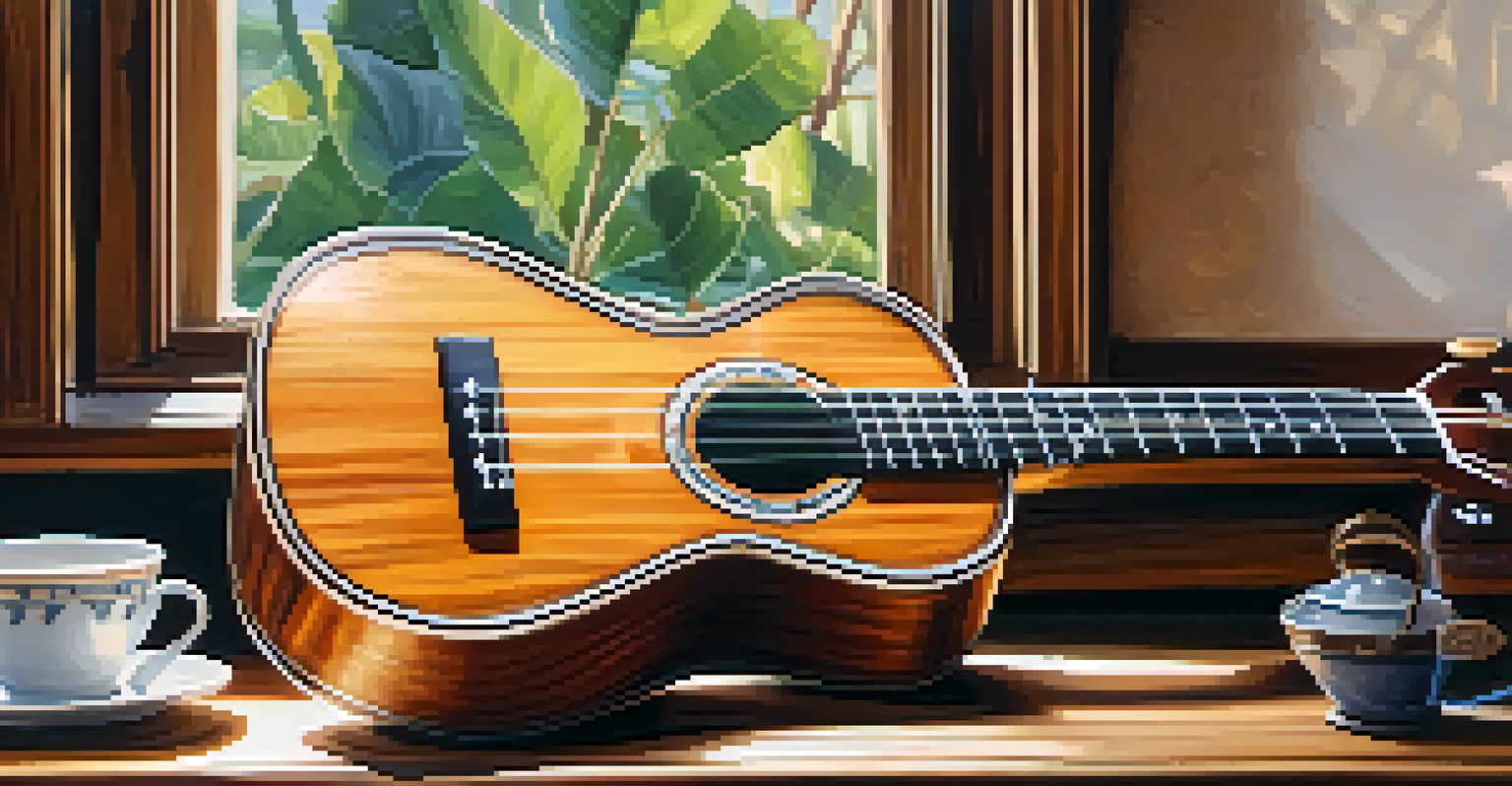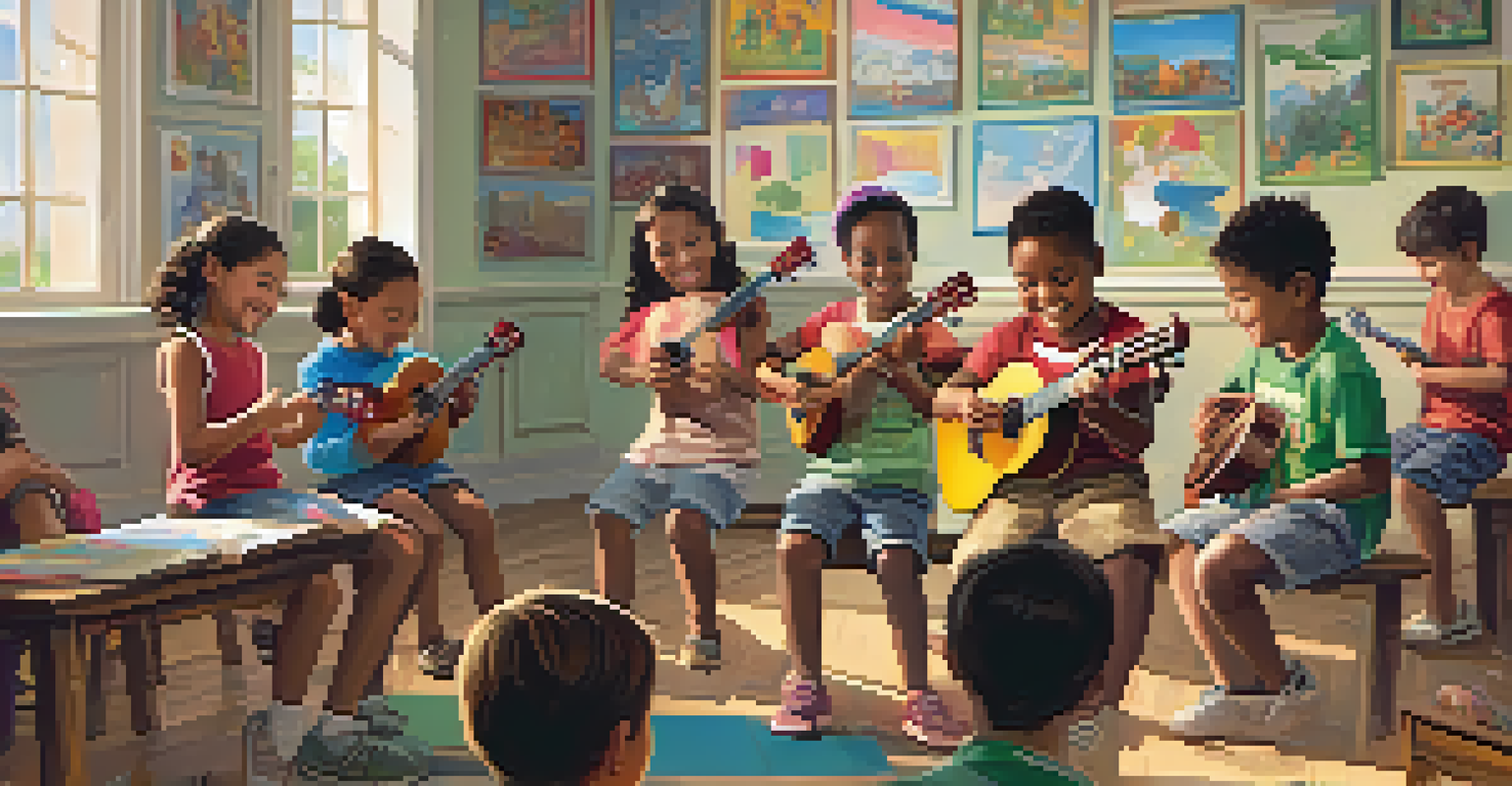The Ukulele's Role in Global Cultural Exchange Among Musicians

Introduction: The Ukulele's Cultural Significance
The ukulele, often seen as a cheerful instrument, has a rich history that transcends borders. Originating in Hawaii, it has traveled the world, adapting to various musical styles and cultures. This little four-stringed instrument has become a symbol of joy and community, making it an essential part of numerous musical traditions.
Music is the universal language of mankind.
Beyond its playful sound, the ukulele serves as a means of cultural exchange among musicians. It allows artists from different backgrounds to collaborate and share their unique sounds, creating a tapestry of global music. This blending of styles enriches the musical landscape and fosters understanding among diverse cultures.
Through festivals, workshops, and online platforms, ukulele players connect with one another, showcasing their cultural heritage. Each note played carries stories and traditions, proving that music is a universal language that can bridge gaps and create lasting bonds.
The Ukulele's Journey from Hawaii to the World
The journey of the ukulele began in the late 19th century when Portuguese immigrants brought the braguinha to Hawaii. This small stringed instrument quickly gained popularity, evolving into the ukulele we know today. Its catchy melodies and easy playability made it a favorite among locals and tourists alike.

As the ukulele spread beyond Hawaiian shores, it caught the attention of musicians worldwide. From the folk scenes of the United States to the pop charts of Japan, its versatility made it a staple in various genres. Artists began experimenting with the ukulele, incorporating it into their unique styles, which further fueled its global appeal.
Ukulele as a Cultural Ambassador
The ukulele's global journey showcases its ability to bridge cultural gaps and foster unity among musicians.
This cross-cultural journey exemplifies how the ukulele can serve as a cultural ambassador. By embracing and adapting to different musical influences, it has fostered a sense of unity among musicians across the globe, encouraging collaboration and creativity.
The Role of Online Communities in Ukulele Culture
In the digital age, online communities have played a crucial role in promoting ukulele culture. Platforms like YouTube, Instagram, and TikTok have allowed musicians to share their love for the ukulele with a global audience. These platforms have created spaces for collaboration, learning, and celebration of the instrument.
The beautiful thing about music is that it connects people. It carries a message, and we, as musicians, are the messengers.
Social media challenges and tutorials have made it easier than ever for beginners to pick up the ukulele and join the community. Musicians from diverse backgrounds can showcase their skills and learn from one another, fostering a sense of belonging. This accessibility is vital in encouraging cultural exchange and innovation.
Through virtual jam sessions and collaborative videos, musicians can connect regardless of geographic barriers. These interactions not only enhance individual skills but also promote a deeper understanding of different musical traditions, reinforcing the ukulele's role as a unifying force.
The Ukulele in Popular Culture: A Global Phenomenon
The ukulele's presence in popular culture has significantly contributed to its global reach. From viral songs to prominent appearances in movies and television shows, it has captured the hearts of many. Artists like Israel Kamakawiwoʻole and Eddie Vedder have introduced the ukulele to new audiences, highlighting its emotional depth.
These cultural moments have inspired countless individuals to pick up the ukulele and explore its possibilities. As it becomes a staple in pop music, the instrument encourages collaboration between artists from various backgrounds. This fusion of styles not only enhances the music but also promotes cultural appreciation.
Online Communities Enhance Ukulele Culture
Digital platforms enable collaboration and learning, making the ukulele accessible to a diverse audience worldwide.
The ukulele’s role in popular culture serves as a reminder of the power of music to transcend boundaries. It demonstrates how an instrument can bring people together, regardless of their differences, fostering a sense of community and shared experience.
Cultural Exchange Through Ukulele Festivals
Ukulele festivals have become vibrant hubs of cultural exchange, gathering musicians from around the world. These events offer opportunities to learn from one another, share stories, and celebrate the instrument's diverse heritage. From workshops to performances, festivals create a rich tapestry of sounds and cultures.
Attendees can immerse themselves in different musical styles, gaining insights into the traditions behind them. This exchange not only enriches the participants' skills but also fosters mutual respect and understanding among different cultures. It's a beautiful reminder of how music can unite us all.
Moreover, these festivals often feature collaborations between artists from various backgrounds, resulting in unique performances. Such moments highlight the ukulele's ability to act as a bridge between cultures, proving that music is indeed a universal language that can foster connections.
Teaching and Learning: The Ukulele as an Educational Tool
The ukulele has found its way into classrooms and community programs as an engaging educational tool. Its simplicity makes it an ideal instrument for teaching music to children and adults alike. Many educators use the ukulele to introduce concepts of rhythm, melody, and harmony, fostering a love for music.
By learning the ukulele, students can explore various musical genres, from folk to jazz, encouraging cultural appreciation. This exploration helps them understand the roots of different musical traditions while developing their own unique style. The ukulele becomes a gateway to learning about the world through music.
Ukulele Festivals Promote Exchange
Festivals serve as vibrant hubs for musicians to share their cultural heritage and collaborate, enriching the global music landscape.
Additionally, group lessons and community workshops create opportunities for collaboration and cultural exchange. Participants from varied backgrounds come together to share their musical influences, fostering a sense of unity and understanding. The classroom becomes a microcosm of the global music community.
Conclusion: The Ukulele's Lasting Impact on Global Music
The ukulele's journey reflects the power of music in fostering global cultural exchange. Its ability to adapt to various musical styles and traditions has made it a beloved instrument worldwide. As musicians from different backgrounds come together to share their stories, the ukulele proves that music knows no boundaries.
Through festivals, online communities, and educational programs, the ukulele continues to inspire collaboration and creativity. It serves as a reminder of the beauty of diversity in music and the importance of cultural understanding. The connections formed through this instrument enrich our lives and foster a sense of belonging.

As we look to the future, the ukulele will undoubtedly continue to play a vital role in connecting musicians globally. Its cheerful sound and adaptable nature will keep bringing people together, reminding us that music is a universal expression of our shared humanity.